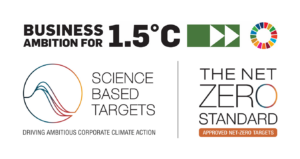SBTi validates MartinBauer’s pioneering climate goals
- The Science Based Targets initiative (SBTi) has checked and validated the climate goals that the nature network has pledged to achieve by 2040 and its accompanying climate protection plan.
- The nature network consists of four divisions: MartinBauer, Finzelberg, PhytoLab and Europlant Group.
- MartinBauer is making a substantial contribution to keeping global warming down to no more than5°C in comparison with pre-industrial levels (the 1.5°C target set by the Paris Agreement).
- MartinBauer is one of the first companies to pursue approved targets in accordance with the SBTi’s newly developed FLAG (Forest, Land and Agriculture) framework. The FLAG standard helps companies with supply chains in forestry and agriculture to reduce their CO2e emissions arising from land use.
MartinBauer has pledged to pursue climate protection measures along its entire supply chain. The company’s targets, pioneering within the sector, and its clearly defined plan for achieving those targets are science-based and in line with the Paris Agreement’s 1.5°C scenario. Now, in May 2024, that has been confirmed through independent scrutiny by the renowned Science Based Targets initiative (SBTi). The goals have now been published on the SBTi website (Target dashboard – Science Based Targets Initiative) – an important milestone in MartinBauer’s global climate protection journey.
“We are proud that the SBTi has acknowledged all the hard work we undertook in the run up to the validation,” says Sebastian Sieben, CEO of MartinBauer’s Europe Hub. “As a major supply and solutions partner for the tea, beverage, food, animal nutrition, pharmaceutical and dietary supplements industries, we have set the most ambitious CO2e reduction goals in the sector. Our climate protection plan, which is based on the latest scientific findings and methods, is spearheading the sustainable transformation of our sector. And that matters – because sustainability is crucial for any company wishing to remain fit for the future.”

Validated climate goals for 2030 (SBTi near-term targets)
- “By 2030 the company will reduce its direct and indirect greenhouse gas emissions (Scopes 1 and 2) by more than half (-58% compared to the base year 2020).” To achieve that, MartinBauer is, for example, expanding its use of renewable energies and improving energy efficiency in its production processes.
- “The company will increase the share of green electricity at its sites to 80% by 2025 and to 100% by 2030 (compared to 4% in the base year 2020).” In 2023, the share of green electricity throughout the group was 50%.
- “The company will also reduce CO2e emissions in its upstream and downstream value creation chain (Scope 3) by more than half by 2030 (-56% compared to the base year 2020).” To achieve that, MartinBauer is working with its raw materials partners to develop best practices and cooperating closely with its customers.
- “By 2030, the company will reduce emissions from forestry, land use and agriculture (FLAG) by 56% compared to the base year 2020.” To achieve that, MartinBauer is investing its energies in innovative concepts such as agroforestry, compost management, building humus in the soil, and sustainable carbon sequestration.
- “The company also pledges to obtain 100% of its primary raw materials from deforestation-free supply chains by December 31, 2025.” To achieve that goal, MartinBauer’s supply chain experts are further developing the company’s international analysis and risk management systems. In those supply chains that are certified in line with the company’s own mabagrown sourcing standard, the principle of verified deforestation-free supply chains has been in place since 2014.
Validated climate goals for 2040 (SBTi long-term targets and net-zero targets)
- “By 2040, the company will reduce its CO2e emissions in Scopes 1, 2 and 3 and its FLAG emissions by 90% compared to the base year 2020.”
- “In accordance with the SBTi standards, the company also commits to a net-zero target: by 2040 it will reduce its CO2e emissions by 90% and will compensate for the remaining 10% through effective, long-lasting measures that remove CO2e from the atmosphere or sequester them over the long term.”
Climate neutrality by 2030
Going above and beyond the climate targets that have been validated by the SBTi, MartinBauer has also set itself the goal of becoming climate-neutral by 2030 with its Go Zero campaign. As well as achieving its ambitious CO2e reduction goals, the company intends to compensate for any remaining emissions. To do so, it will invest in credible CO2e compensation projects that comply with recognized standards – primarily projects within the nature network’s supply chains.
About the SBTi
The leader in its field, the SBTi assesses and validates companies’ climate targets using the latest scientific findings and methods. It was founded as a joint project of the Carbon Disclosure Project (CDP), the United Nations Global Compact (UNGC), the World Resources Institute (WRI), and the World Wide Fund for Nature (WWF). MartinBauer, Finzelberg and Europlant Group joined the initiative in April 2022.
The significance of validation
SBTi validation is an important part of a company’s climate protection efforts, ensuring it makes a genuine contribution to achieving the aims of the Paris Agreement. The SBTi considers the size of the company and its sector in order to assess the contribution that should be made. The SBTi’s robust framework and uniform guidelines allow for comparison between individual companies’ climate protection efforts.